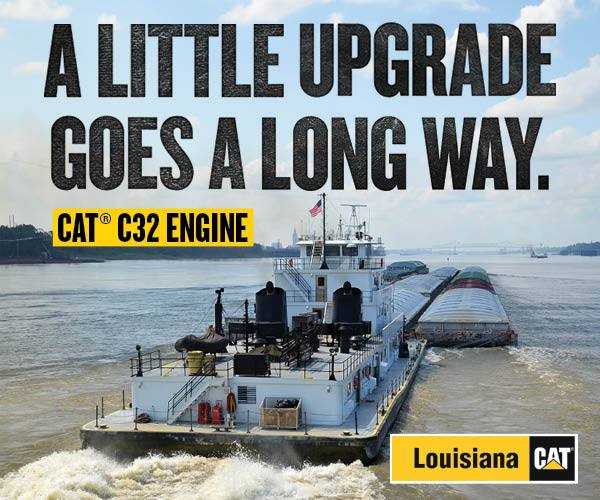UMWA Advocates For Upper Miss, Builds Partnerships Far Beyond
The Upper Mississippi Waterway Association (UMWA), founded 93 years ago, represents maritime stakeholders in the upper Midwest, in particular the states of Illinois, Iowa, Minnesota, Missouri and Wisconsin.
UMWA members include manufacturers, utilities, grain growers and movers, marine contractors and service providers, cooperatives, shippers, towing and barge companies and recreational boaters. While the traditional boundaries of the Upper Mississippi River extend from its headwaters at Lake Itaska, Minn., to around St. Louis, UMWA’s connections and interests go far beyond that, extending to the Great Lakes, the full length of the Mississippi River and even the Pacific Northwest.
Recently, the Upper Mississippi Waterway Association’s top leaders—Gary Williams, UMWA’s executive director, and Zac Morris, this year’s UMWA president and coastal department manager for AMI Consulting Engineers—discussed the organization’s goals, concerns and vision for the Upper Miss in an interview with The Waterways Journal.
Williams, who has led the association since March 2024, said his 34 years of experience in grain merchandizing and logistics laid a good foundation for understanding the interdependency of commodities moved on the Upper Mississippi River and between various modes of transportation in the region. With interdependency, Williams said, comes a measure of fragility.
“All of these things affect one another dramatically, and there is a fragility to the working waterway,” Williams said. “We’ll lose it if we’re not using it, and we’re going to want it. We’re going to need this artery of waterway. It’s a guarantee that there’s going to be a need for this waterway, even more so than what the average person sees today, just to have redundancy and resiliency in the transportation system in the future.”
Williams said one way he understands his role with UMWA—and one role of UMWA as an organization—is to be a “conveyor between silos.” Serving as a conveyor between silos might mean helping multiple parts of an agency communicate with one another, or communicating on behalf of stakeholders and assisting with the process to overcome barriers to projects, allowing progress or the continuance of operations, as well as supporting access to funding sources. That information conveyance also extends to community outreach and education, Williams said.
Morris pointed to channel maintenance, specifically the disposal of dredged material and the lack of upland storage capacity, as a major issue facing UMWA members and communities along the Upper Mississippi River. Lack of storage capacity can restrict the movements of barges.
“There’s new infrastructure that’s been developed to manage those materials, to take that off the river, transport it and, essentially, use it for beneficial use long term,” Morris said. “That’s just one case where dredging affects infrastructure, which affects roadways and citizens in the community.”
Lack of dredging funds, issues related to dredged material storage and low water all can have a direct impact on tow capacity on the system, Williams said, with the channel in places narrower than its authorized dimensions. All those issues affect reliability, Williams said, adding that the channel in some places is narrower than its authorized dimensions.
“So how do we rectify that issue?” Williams said. “That’s what we’re working on.”
Over the past year, UMWA members have been involved with Holcim Aggregate Backwaters Project, which would supply construction-grade aggregate to the Minneapolis-St. Paul area.
Beyond waterway infrastructure issues and membership development, Williams said UMWA is strengthening its relationship with waterway stakeholders on the Columbia Snake River System. Wheat growers and other stakeholders from the Pacific Northwest traveled to the Upper Mississippi region last year and toured the entire length of the Mississippi River. Earlier this month, representatives from UMWA attended and gave comments at the Marine Highway 84 conference in the Pacific Northwest and toured the navigable commercial waterway from Astoria, Ore., to Lewiston, Idaho.
“They’re fighting every day to keep those navigable locks and dams in place,” Williams said.
Williams and Morris both recognized workforce development as an issue facing stakeholders of the Upper Mississippi River, much like every other waterway and every industry. Recognizing that, UMWA is hoping to partner with We Work the Waterways, an education and workforce development-focused organization, for an industry interaction day in the late summer or fall. UMWA’s annual conference is also set for the fall.
UMWA’s next member event will be July 24 at the National Mississippi River Museum & Aquarium in Dubuque, Iowa. Riverview Boat Store & Tug Service will provide lunch. For more information or to learn more about the Upper Mississippi Waterway Association, visit www.umwa.net.


